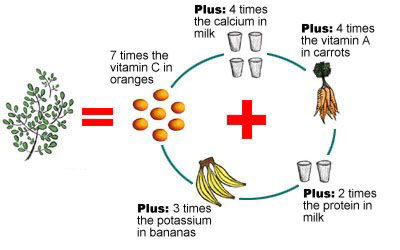A lack of consumption of balanced nutrients or feeding upon the
wrong kinds of food leads to an accumulation of toxins within the body,
resulting in chronic diseases in the long run. Since no single food
group can nourish the body with all the vital ingredients it requires,
it is important that we consume a variety of healthy foods to derive
the nutrition our body needs. Children are the vulnerable groups who
need a complete nutrition for their growth and for their physical and
mental fitness.
Moringa Oleifera is a very good natural supplement needed by every child for
their well being. Calcium is particularly important in building strong
bones and teeth. Bone density suffers when calcium needs are not met
during childhood years. Calcium, the most abundant mineral in the
body, gets particular attention for its role in keeping bones strong.
Moringa contains 4 times the calcium content in milk. Fractures
reported among children and young adults are on the rise due to calcium
deficiency. It is also a key mineral needed for muscular contractions,
beating of the heart, is involved in wound healing and proper function
of hormones and neurotransmitters in the brain. Calcium in the blood
helps maintain heart rhythm, and promotes proper bloody clotting and
muscular function.
Magnesium is important to 300 bodily functions, including the
muscles, nerves and heart. It boosts your immune system and strengthens
bones. Iron is an oxygen-carrying component of blood. Children need
iron for expanding blood volume which is accompanied during periods of
rapid growth. Iron is a common concern for babies because several
factors can lead to its deficiency in infants. Iron content of Moringa
is 25 times of iron in spinach.
When children do not eat enough fruits and vegetables they run the
risk of having low intakes of vitamins A and C. B Complex Vitamins
(thiamin, niacin, riboflavin and other B vitamins) come from a variety
of foods, including grain products, meat and meat substitutes and dairy
products. Most of the children are not consuming the healthy foods
instead they are attracted towards the mal-nutrient snack foods. These
factors will lead to decrease the nutritional profile of the children.
When appetites slow down and children do not seem to be eating
nutritiously, concerned parents consider using a vitamin-mineral
supplement. Here comes the important of Moringa as it vitamin to the
extent that it is one of the richest plant sources of Vitamin. Moringa
has Vitamin A (Beta Carotene), Vitamin B1 (Thiamine), Vitamin B2
(Riboflavin), Vitamin B3 (Niacin), Vitamin B6 Pyrodixine), Vitamin B7
(Biotin), Vitamin C (Ascorbic Acid), Vitamin D (Cholecalciferol),
Vitamin E (Tocopherol) and Vitamin K. The list of Minerals present in
Moringa is abundant and few of the main minerals include Calcium,
Copper, Iron, Potassium, Magnesium, Manganese and Zinc. Moringa has 4
times more Calcium than that of milk, Moringa, with 25 times more Iron
than that of Spinach. Moringa with 3 times the potassium in Banana
assists in the regulation of the acid-base and water balance in the
blood and the body tissues. It assists in protein synthesis from amino
acids and in carbohydrate metabolism.
Vitamins and other nutrients are critically important for the proper
physical, cognitive and even emotional development of the babies.
Vitamins, minerals and other essential nutrients help create the
neurotransmitters that relay signals between these brain Children who
do not get adequate nutrition in their first few years of life are more
likely to have problems throughout life. This includes lower IQ, slower
language and motor development, and poorer school performance.
Healthy and nutritious diet is wonderful; however, you can never be
sure that it contains all the vitamins, minerals, antioxidants and
phytochemicals which can spark the healthy beginning which gets
completed by consuming Moringa every day.

